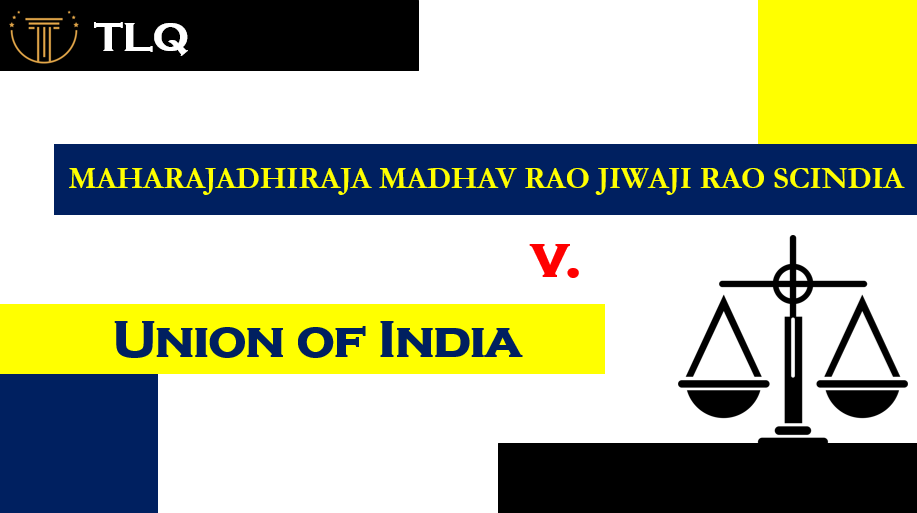Published On: 20th August, 2024
CASE DETAILS
Case citation: (1997) 1 SCC 416: 1997 SCC (Cri) 92
Date of Judgement: December 18, 1996
Court: Hon’ble Supreme Court of India
Case No: Writ Petition (CRL) No. 592 of 1987
Nature of Case: Criminal
Bench: Kuldip Singh and Dr A.S. Anand, JJ
INTRODUCTION
Custodial deaths in India represent a severe breach of an individual’s physical integrity and dignity, causing significant mental distress within prison settings. The act of custody involves legally restricting a person’s freedom of movement, often necessary to prevent them from committing further crimes, tampering with evidence, or intimidating witnesses during ongoing investigations. Before the DK Basu case, there was a notable lack of proper legal frameworks and procedures regarding individuals in custody, leading to a troubling increase in custodial deaths and instances of violence. This inadequacy allowed perpetrators to avoid accountability for their actions. The DK Basu case emerged as a critical response to address and regulate such incidents, aiming to prevent custodial deaths and ensure the protection of detainees’ rights under Article 21 of the Indian Constitution.
Police brutality remains a persistent issue in India, characterized by instances where law enforcement officers misuse their authority, resulting in physical or mental harm to individuals in custody. Custodial deaths have been a longstanding concern, prompting various laws and judicial precedents to establish clear guidelines for the treatment of suspects and detainees during arrests. Courts consistently emphasize the fundamental rights guaranteed by Article 21[1], including the right to life, personal liberty, and dignity. The landmark DK Basu case stands out for its role in addressing police brutality and outlining specific protocols for arrests and detentions. This Supreme Court decision underscored Article 21’s scope in safeguarding individuals from abuse while in custody, particularly in response to the disturbing trend of deaths occurring in police custody.
FACTS OF THE CASE
DK Basu, the Executive Chairman of Legal Aid Services, addressed a letter to the Chief Justice of India, highlighting newspaper articles on custodial deaths or deaths in police custody/lockups, as well as various forms of custodial torture and inhuman treatment of prisoners. The Supreme Court, upon receiving this letter, took cognizance and issued a notice to the state of West Bengal. However, the government of West Bengal countered the petition, arguing it was misleading and baseless, denying any such incidents. Subsequently, Ashok Kumar Johri wrote another letter drawing attention to the custodial death of Mahesh Bihari in Aligarh police custody. Both letters were treated as Writ Petitions[2] and were heard together.
ISSUES RAISED
- Do custodial death and different forms of custodial torture constitute violations of fundamental rights?
- Should compensation be granted to victims of custodial torture?
- Was there a necessity to establish guidelines for the arrest of individuals?
PETITIONERS CONTENTION
- Prevention of Physical and Mental Suffering
The petitioner emphasized that detainees often suffer physical and mental abuse in police custody or confinement facilities. This includes instances of physical assault or rape, which result in severe trauma that goes beyond the current legal framework’s scope.
- Civilized Nation Perspective
The petitioner argued that as a civilized nation, it is imperative to take significant steps to eliminate such inhumane practices. This implies establishing robust guidelines and safeguards to protect the rights and dignity of individuals in custody.
RESPONDENT CONTENTIONS
- State’s Existing Mechanisms
The respondents, represented by counsel from various states and Dr. A.M. Singhvi, asserted that their respective states already had well-established mechanisms to deal with custodial issues. They argued that these mechanisms were sufficient to address any concerns regarding custodial violence[3].
- Guidelines and Support
Despite asserting the adequacy of existing mechanisms, the respondents also acknowledged the seriousness of custodial violence. They suggested that the court should consider establishing specific guidelines aimed at reducing or preventing such violence. Additionally, they proposed measures to provide support to the families of individuals who die in custody due to torture or other forms of abuse.
ANALYSIS OF BOTH PARTIES CONTENTION
The petitioner stressed the need for comprehensive legal measures to prevent custodial violence and uphold human rights, the respondents defended the current state mechanisms while acknowledging the need for additional guidelines and support systems. This case ultimately led to significant legal developments, including the formulation of guidelines by the Supreme Court of India to prevent custodial abuse and ensure the protection of detainees’ rights.
LEGAL PROVISION
- Article 20 (3), 21, 22, 226 and 32 of the Indian Constitution.
- Section 41, 46, 49, 50, 53, 54, 56, 57, 167, 174 and 176 of Crpc,1973 (Criminal Procedure Code)
- Section 147, 149, 201, 218, 220, 302, 304, 330, 331, 34 and 342 of IPC,1860 (Indian Penal Code)
ORDER OF THE COURT
The Court expressed that custodial violence, including torture and deaths in custody, undermines the rule of law. It considered such acts among the gravest crimes in a civilized society governed by law. Despite constitutional and statutory provisions safeguarding personal liberty and life, the increasing instances of torture and deaths in police custody are deeply concerning. The Court referenced the case of Nilabati Behera v. State of Orissa[4], emphasizing that prisoners and detainees retain their Fundamental Rights under Article 21, with any restrictions imposed only as permitted by law.
RATIO DECIDENDI
The principle established is that when a right is guaranteed by the State, the remedy must be sought against the State if it fails to fulfill its constitutional obligation. Article 21 guarantees the right to life and personal liberty, which includes the right to live with human dignity and protection against torture and assault by the State or its officials. Article 22 ensures protection against arrest and detention, requiring individuals to be informed of the grounds of arrest and allowing them to consult and defend themselves with a legal practitioner of their choice.[5] Article 20(3) prohibits compelling a person accused of an offense to be a witness against themselves[6].
GUIDELINES ISSUED BY THE COURT
In the landmark case of D.K. Basu vs. State of West Bengal, the Supreme Court outlined specific procedural guidelines for arrests:
- Law enforcement personnel conducting arrests and interrogations must prominently display accurate identification badges with their names and official positions. Their details must also be meticulously logged in a registry.
- At the time of arrest, the arresting officer must prepare an arrest memorandum, which should be witnessed and countersigned by either a family member of the arrestee or a respected local figure. This document must include precise details such as the time and date of the arrest.
- Upon arrest or detention, the individual has the right to have a friend, relative, or another concerned person informed of their situation without delay, unless the witness to the arrest memorandum already fulfills this role.
- It is incumbent upon the police to promptly notify the location and particulars of the arrest to the next of kin residing outside the district or town through the Legal Aid Organization and the local police station within a specified period of 8 to 12 hours from the time of the arrest.
- The person under arrest must be promptly informed of their right to have someone notified of their custody situation.
- A comprehensive record detailing the arrest must be maintained at the place of detention, including the identity of the informed next of kin and the specifics of the police officials overseeing custody.
- Upon request, the arrestee should be examined at the time of arrest, with any injuries–both major and –meticulously documented in an inspection report. This report should be signed by both the arrestee and the apprehending officer, with a copy furnished to the arrestee.
- The arrestee is entitled to a medical examination by a qualified doctor appointed by the Director of Health Services every 48 hours during their detention. A panel of such doctors should be designated for all Tehsils and Districts to ensure proper medical oversight.
- Copies of all pertinent documents, including the arrest memorandum, must be promptly dispatched to the Magistrate for official records.
- The arrestee should be allowed to consult with their legal counsel during interrogation, though not necessarily continuously throughout the proceedings.
- Police control rooms at both district and State headquarters must be equipped to receive and display information regarding arrests and the whereabouts of detainees within 12 hours of their apprehension.
These guidelines were established to uphold procedural fairness and safeguard the rights of individuals in police custody.
OUTCOME OF THE JUDGEMENT
The Supreme Court of India has established comprehensive guidelines for both Central and State Investigating agencies to adhere to during arrests and detention procedures. These guidelines were designed to safeguard detainee rights, yet their consistent application has varied among states. Although an Anti-Torture Bill was debated in Parliament in 2010 but not passed, the DK Basu vs. State of West Bengal guidelines were integrated into the Criminal Procedure Code 1973 via the Code of Criminal Procedure (Amendment) Act 2008, effective from November 1, 2010. This amendment introduced advancements like using video conferencing for witness evidence and expediting trials through special courts. There has been a noticeable change in police arrest procedures and post-arrest protocols following the present case, with heightened awareness among law enforcement agencies. Training initiatives have been launched to educate officers on these guidelines and ensure compliance. The case underscored police accountability for any harm inflicted on detainees, asserting their right to life under Article 21 of the Constitution. The primary issue addressed by the case was controlling police brutality and misuse of power, emphasizing the need for stronger safeguards. The Supreme Court also mandated widespread circulation of these guidelines among relevant authorities, with disobedience subject to contempt of court penalties.
CASE OBSERVATION
The DK Basu case is widely acknowledged as a pivotal milestone in criminal jurisprudence. Before DK Basu, incidents of custodial violence and deaths were frequent, with occasional compensations but lacking accountability mechanisms for the police. This case addressed these critical issues by laying down comprehensive guidelines concerning custodial deaths and violence. It was a groundbreaking case that established police liability in such circumstances. Despite a decrease in custodial deaths and violence post-DK Basu, the problem persists, with some guidelines existing mainly on paper, rather than being effectively implemented.
CONCLUSION
The DK Basu case stands as a landmark in criminal jurisprudence. Before DK Basu, incidents of custodial violence and deaths occurred, with sporadic compensations granted but lacking any provision or rule for imposing liability. The Supreme Court recognized the urgency of addressing this issue comprehensively by establishing guidelines for custodial deaths and violence. The Court stipulated that failure to adhere to the aforementioned requirements would result in departmental actions against the relevant officials, who may also face punishment for Contempt of Court. This case was pioneering in holding the police accountable and aimed to resolve the issue definitively.
Reference(s):
[1] ‘Article 21 in Constitution of India’ <https://indiankanoon.org/doc/1199182/> accessed 09 July 2024.
[2] In India, a writ signifies a formal written directive issued by a court, usually of superior authority, instructing a lower court, government official, or any individual to execute a precise action or desist from doing so. Writ petitions are crucial for upholding and enforcing fundamental rights as guaranteed by the Constitution of India.
[3] Ashish Tripathi, DHNS, ‘Abhishek Manu Singhvi Moves Supreme Court for Reviving D K Basu Case’ (Deccan Herald) <https://www.deccanherald.com/india/abhishek-manu-singhvi-moves-supreme-court-for-reviving-d-k-basu-case-860844.html> accessed 10 July 2024.
[4] 1993 2 SCC 746
[5] ‘Article 22 in Constitution of India’ <https://indiankanoon.org/doc/581566/> accessed 11 July 2024.
[6] ‘Article 20(3) in Constitution of
India’ <https://indiankanoon.org/doc/366712/> accessed 11 July 2024.


